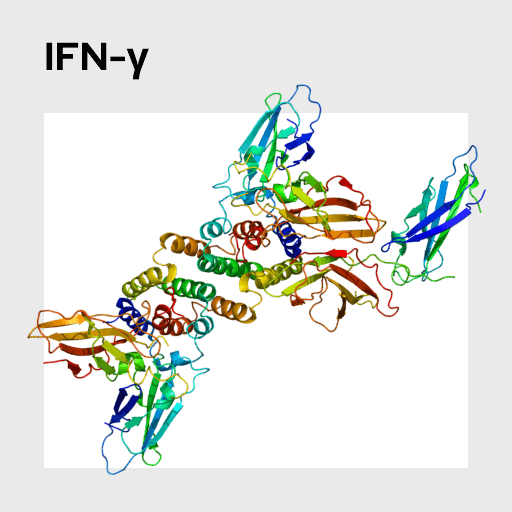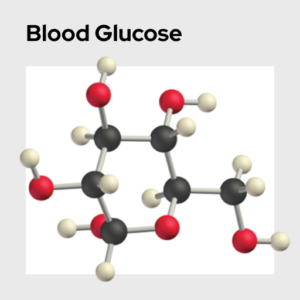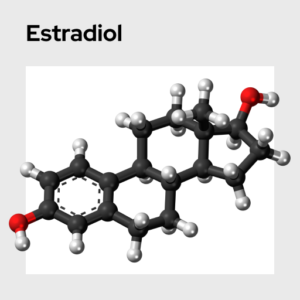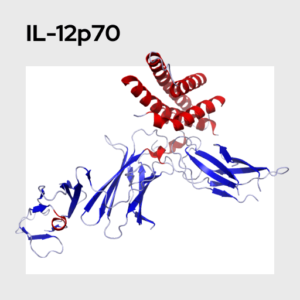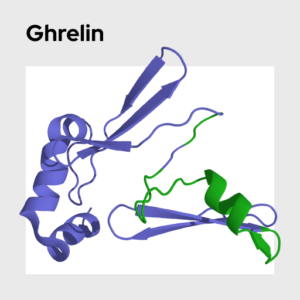Interferon gamma (IFN‐γ)
Interferon gamma (IFN‐γ) is a pleiotropic cytokine that plays an important role in inducing and modulating an array of immune responses, particularly in the context of viral and intracellular bacterial infections. IFN‐γ is primarily produced by lymphocytes and promotes macrophage activation, orchestrates the activities of the innate immune system, regulates Th1/Th2 balance, and controls cellular proliferation and apoptosis. Research finds that IFN‐γ may play a role in modulating behavioral responses to stress. This analyte is eligible for multiplexing.
Name: Interferon gamma (IFN‐γ)
Category: Health & Inflammation
Type of test: Blood + Saliva
IFN‐γ is a homodimeric type II interferon involved in numerous immune-related activities. IFN‐γ is also involved in both innate and adaptive immunity against viral as well as bacterial and protozoal infections. Clinically, its use is approved for treatment of several conditions, but research has increasingly focused on its potential applications in cancer immunotherapy due to its antitumor effects. Encoded by the IFNG gene, each IFN‐γ subunit is composed of 6 alpha helices, with its primary biological interaction being with IFNGR1 and IFNGR2, both of which are receptors specifically related to IFN‐γ signaling. The heterodimeric receptors activate JAK-STAT signaling to exert its biological mechanisms, although there is an alternative mechanism by which IFN‐γ binds to membrane heparan sulfate, effectively inhibiting IFN‐γ activity.
In the context of a bacterial or viral infection, IFN‐γ is known to be secreted by both helper as well as cytotoxic T cells, macrophages, NK cells, and various mucosal epithelium. Upon binding to its receptor and activating the associated signaling molecules, it has a regulatory effect on a number of genes, which is largely responsible for its cellular effects. Among these effects are upregulation of antigen presentation on macrophages, increased iNOS activity, leukocyte migration, immunoglobulin production, and others. Ultimately these all function to potentiate the innate as well as adaptive immune responses and allow for sufficient complement pathway activation.
While acute stress tends to increase serum/plasma levels of IFN-γ, there is also evidence that early life stress may negatively impact interferon signaling, leading to increased susceptibility to infectious illnesses. Accordingly, IFN-γ may serve as an important biomarker of stress-related pathologies. IFN-γ can be measured in both saliva and serum / plasma, but the extent to which levels in these sample types correlate is variable.
Tau, G. & Rothman, P. (1999). Biologic functions of the IFN-gamma receptors. Allergy, 54,1233-1251. (link)
Ni, L. & Lu, J. (2018). Interferon gamma in cancer immunotherapy. Cancer Medicine, 7, 4509-4516. (link)
Miller, C. H., Maher, S. G., & Young, H. A. (2009). Clinical Use of Interferon-gamma. Annals of the New York Academy of Sciences, 1182, 69-79. (link)
Slavish, D. C., Graham-Engeland, J. E., Smyth, J. M., & Engeland, C. G. (2015). Salivary markers of inflammation in response to acute stress. Brain, behavior, and immunity, 44, 253-269. https://pubmed.ncbi.nlm.nih.gov/25205395/
Steptoe, A., Owen, N., Kunz-Ebrecht, S., & Mohamed-Ali, V. (2002). Inflammatory cytokines, socioeconomic status, and acute stress responsivity. Brain, behavior, and immunity, 16, 774-784. https://psycnet.apa.org/record/2003-01040-006


